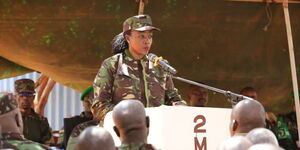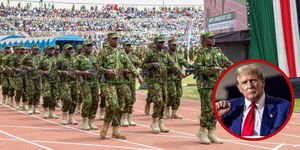2002 was a monumental year for Kenya, as it had all the ingredients to either usher in a new era of democracy, or plunge the country even further into aristocracy.
Retired President Daniel Arap Moi's 24-year-reign, was for the first time staring at the possibility of losing in a general election.
Moi's decision to openly back Uhuru Kenyatta's bid for the presidency as KANU's flagbearer, could be argued as the catalyst that kickstarted a storm that forever changed the nation's future.
According to Stephen Kalonzo's autobiography, Against All Odds, cracks formed within the ruling party, as most felt that Moi's choice of successor was wrong.
"Why Moi picked Uhuru to succeed him and why he stuck by him even when he should have realised that the 'Uhuru project' would only work to the detriment of Kanu is still a puzzle for me," an excerpt of the book revealed.
Raila Odinga - then serving as a member of KANU, and Nicholas Biwott tried to warn Moi, making it clear that his choice of successor would not go down well with the electorate, but the president remained adamant.
He officially declared his support for Uhuru during a rally in Mt Elgon on June 30, 2002.
This finally led to the defection of Raila Odinga, Joseph Kamotho, Moody Awori, George Saitoti and Kalonzo from KANU, going on to form the Rainbow group.
A name Kalonzo allegedly coined after USA's Reverend Jesse Jackson's Rainbow Coalition.
When Moi realised that things were getting out of hand, he summoned the KANU rebels to an emergency meeting at State House on Moi Day, October 10, 2002.
Members present at the penultimate showdown were Kalonzo, Raila, Saitoti, Awori, Uhuru, Biwott and Yusuf Haji.
The rebels made clear their disapproval of Uhuru's candidacy, with Kalonzo going as far as stating that even Mama Ngina (Uhuru's mother), was supporting their choice of a Mwai Kibaki presidency.
"The truth, Sir, is that unless my friend Uhuru withdraws, Kanu is going to lose,” Kalonzo asserted during the heated meeting.
Moi felt betrayed by individuals he had groomed politically and made his feelings known to all present at the meeting.
It ended at an impasse, with the rebels quickly heading to the Nairobi Serena Hotel, where they declared their resolve to oust KANU from power.
By the time the final votes were being tallied on December 2002, it was clear that the Kibaki Tosha movement had carried the day with a landslide victory, ushering in a new era of democracy.
"In a vote widely hailed as a step forward for democracy in Africa, Kenyans have resoundingly defeated the party that has ruled over them for nearly four decades and selected the opposition leader Mwai Kibaki as their new president," read a section of the New York Times report dated December 30, 2002.












